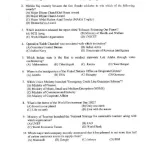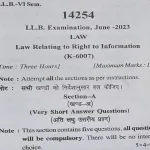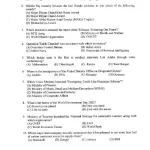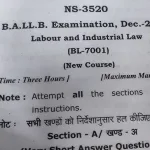LLB Question Paper – A Comprehensive Q&A
Preparing for an LLB examination requires an understanding of different subjects, including Criminal Law, Constitutional Law, Family Law, Contract Law, and more. This guide provides a detailed set of questions and answers for each subject to help students understand the topics better and perform well in exams.
Criminal Law
Question: What is the mens rea in criminal law?
Answer: Mens rea refers to the mental state or intent of a person while committing a crime. It is a fundamental element to establish criminal liability.
Question: Define actus reus.
Answer: Actus reus refers to the physical act or unlawful omission that constitutes a criminal offense. Both actus reus and mens rea are required for a crime.
Question: What is the difference between theft and robbery?
Answer: Theft involves the unlawful taking of property without force, while robbery includes theft with the use or threat of force.
Question: What is criminal conspiracy under the IPC?
Answer: Criminal conspiracy under IPC Section 120A involves an agreement between two or more persons to commit an illegal act or legal act by illegal means.
Question: Explain the doctrine of transferred malice.
Answer: Transferred malice occurs when the intent to harm one person inadvertently results in harm to another. The intent is transferred to the actual victim.
Question: What is culpable homicide?
Answer: Culpable homicide is the act of causing death with the intention or knowledge that it is likely to cause death but not amounting to murder.
Question: Define the term “bail.”
Answer: Bail is the conditional release of a person accused of a crime, ensuring their appearance in court.
Question: What are the types of punishment under IPC?
Answer: The types include death penalty, life imprisonment, imprisonment (simple or rigorous), forfeiture of property, and fine.
Question: What is the meaning of abetment?
Answer: Abetment means encouraging, instigating, or aiding someone to commit a crime.
Question: Define the term “criminal breach of trust.”
Answer: It involves misappropriation or dishonest use of property entrusted to someone in violation of trust.
Constitutional Law
Question: What is the significance of Article 14 of the Constitution?
Answer: Article 14 guarantees equality before the law and equal protection of the laws within the territory of India.
Question: Define writ jurisdiction under the Constitution.
Answer: Writ jurisdiction empowers the courts to issue writs for enforcement of fundamental rights or legal rights.
Question: What are the types of writs available in India?
Answer: The five types of writs are Habeas Corpus, Mandamus, Prohibition, Certiorari, and Quo Warranto.
Question: What is the doctrine of separation of powers?
Answer: The doctrine separates the powers of the legislature, executive, and judiciary to ensure no branch exceeds its authority.
Question: Explain the concept of judicial review.
Answer: Judicial review is the power of courts to examine the constitutionality of legislative acts and executive actions.
Question: What is meant by Directive Principles of State Policy?
Answer: They are guidelines in Part IV of the Constitution for the state to establish social and economic democracy.
Question: What is Article 32?
Answer: Article 32 provides the right to constitutional remedies and empowers individuals to approach the Supreme Court for fundamental rights enforcement.
Question: What is the purpose of the Preamble in the Constitution?
Answer: The Preamble outlines the objectives of the Constitution, such as justice, liberty, equality, and fraternity.
Question: What is the difference between federalism and unitary government?
Answer: Federalism divides powers between the central and state governments, while a unitary system centralizes power in the national government.
Question: What is the significance of the 42nd Amendment?
Answer: The 42nd Amendment is known as the “mini-Constitution” as it brought significant changes to the Constitution, including adding the words “socialist” and “secular.”
Family Law
Question: What is the essential condition for a valid Hindu marriage?
Answer: The conditions include consent, age of marriage, prohibited degrees of relationship, and compliance with Hindu Marriage Act provisions.
Question: What is meant by “void marriage”?
Answer: A void marriage is considered null and void from the beginning due to non-fulfillment of essential conditions.
Question: Define the term “maintenance” in family law.
Answer: Maintenance refers to financial support provided to a spouse, children, or parents in case of need.
Question: What are the grounds for divorce under the Hindu Marriage Act?
Answer: Grounds include adultery, cruelty, desertion, conversion, mental disorder, and mutual consent.
Question: What is the concept of alimony?
Answer: Alimony is the financial support awarded to a spouse after divorce for sustenance.
Contract Law
Question: What is a contract?
Answer: A contract is a legally enforceable agreement between two or more parties with mutual obligations.
Question: What is the difference between void and voidable contracts?
Answer: A void contract is not enforceable by law, whereas a voidable contract is valid but can be invalidated by one party.
Question: Define consideration in a contract.
Answer: Consideration is the price paid for a promise, which can be in the form of an act, forbearance, or a return promise.
This set of LLB question papers with answers provides comprehensive coverage of key legal subjects. It is a practical resource for students aiming to enhance their understanding and excel in examinations by learning through a detailed Q&A format
Latest Posts
- Step-by-step guide to download and apply for jee mains admit card 202
- Comprehensive 2025 government holidays and recruitment details for job seekers
- JEE Mains Admit Card 2025: Your Step-by-Step Guide to Downloading the Hall Ticket
- Everything You Need to Know About 2025 Government Holidays Recruitment
- Comprehensive Guide to rrb d group recruitment 2025 – Eligibility, Vacancies, and Application
- Detailed guide to nps trust recruitment 2025 vacancies, eligibility and apply process
- Comprehensive guide to hpcl recruitment 2025 notification, vacancies, and application process
- ignou bed admission 2025 complete recruitment guide with eligibility and process
- Comprehensive Guide to Indian Army Agniveer Recruitment 2025 Notification and Jobs
- Everything You Must Know About CBSE Board Exams 2025 Changes & New Rules






